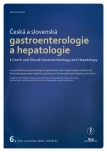Non-steroidal anti-inflammatory drugs induced colopathy, mimicking Crohn’s disease
Authors:
L. Gombošová 1; M. Zakuciová 1; E. Veseliny 1; I. Drahovská 2; M. Švajdler 3; J. Bober 4; M. Oetterová 1
Authors‘ workplace:
I. Interná klinika, Univerzitná nemocnica L. Pasteura, Košice, 2Klinika rádiodiagnostiky a zobrazovacích metód, Univerzitná nemocnica L. Pasteura, Košice, 3Oddelenie patológie, Univerzitná nemocnica L. Pasteura, Košice, 4I. chirurgická klinika, Univerzitn
1
Published in:
Gastroent Hepatol 2010; 64(6): 15-20
Category:
Case Report
Overview
The authors describe the case of a 47-year-old woman with rheumatoid arthritis who took, in the long term, nonsteroidal anti-inflammatory drugs (NSAID). Her state was complicated by sideropenic anaemia with high inflammatory humoral response during complete rheumatological therapy. She was examined by a gastroenterologist. Colonoscopy revealed severe colitis, which was preliminarily evaluated as a Crohn’s disease and a complete therapy including infliximab was administered. However, her condition did not improve and repeated colonoscopy was carried out. This investigation revealed a worse finding with severe continuous ulcerations of the large bowel. The diagnosis was re-evaluated for NSAID induced colopathy. The previous therapy was stopped and colectomy with ileosigmoideostomy was performed. After surgery the patient was feeling well, had no anaemia, and the humoral anti-inflammatory response decreased. The authors present a review of NSAID induced colopathy which can mimic Crohn’s disease.
Key words:
colopathy – non-steroidal anti-inflammatory drugs (NSAID) – Crohn’s disease – rheumatoid arthritis
Sources
1. Lanas A, Esplugues JV, Zapardiel J et al. Education-based approach to addressing non-evidence-based practice in preventing NSAID-associated gastrointestinal complications. World J Gastroenterol 2009; 15(47): 5953–5959.
2. Bátovský M. Gastroprotekcia pri dlhodobom užívaní nesteroidných antireumatík, resp. nízkych dávok kyseliny acetylosalicylovej. Čes a Slov Gastroent a Hepatol 2010; 64(3): 18–23.
3. Stolte M, Hartmann FO. Misinterpretation of NSAID-induced colopathy as Crohn´s disease. Z Gastroenterol 2010; 48(4): 472–475.
4. Frech EJ, Go MF. Treatment and chemoprevention of NSAID-associated gastrointestinal complications. Ther Clin Risk Manag 2009; 5(1): 65–73.
5. Feagins LA, Cryer BL. Do non-steroidal anti-inflammatory drugs cause exacerbations of inflammatory bowel disease? Dig Dis Sci 2010; 55(2): 226–232.
6. Kirsch M. Nonsteroidal antiinflammatory drug colopathy: mimicry of Crohn´s disease and colon carcinoma. J Clin Gastroenterol 1997; 24(2): 121–123.
7. Leong RWL, Chan FKL. Drug-induced side effects affecting the gastrointestinal tract. Expert Opin Drug Saf 2006; 5(4): 1–8.
8. Masannat YA, Harron M, Harinath G. Nonsteroidal anti-inflammatory drugs-associated colopathy. ANZ J Surg 2010; 80(1–2): 96–99.
9. Malone G, Kaushik VY, Morris JA et al. Non-steroidal anti-inflammatory drug colopathy: case reports and review of literature. J R Coll Physicians Edinb 2004; 34 : 32–36.
10. Rybár I, Hyrdel R, Rovenský J. Peptické lézie navodené liečbou nesteroidovými antiflogistikami. In: Jurgoš Ľ, Kužela L, Hrušovský Š et al. Gastroenterológia. Bratislava: Veda 2006 : 289–297.
11. Rybár I. Nesteroidové antireumatiká s hľadiska reumatologickej praxe. In: Gastropatia vyvolaná nesteroidovými antireumatikami. Martin: Osveta 1997 : 8–27.
12. Stolte M, Karimi D, Vieth M et al. Strictures, diaphragms and erosions or ulcerations of ischemic type in the colon should always prompt consideration of non-steroidal anti-inflammatory drug-induced lesions. World J Gastroenterol 2005; 11(37): 5828–5833.
13. Scheiman MJ, Fendrick AM. Practical approaches to minimizing gastrointestinal and cardiovascular safety concerns with COX-2 inhibitors and NSAIDs. Arthritis Res Ther 2005; 7 (suppl 4): 23–29.
14. Guslandi M. Exacerbation of inflammatory bowel disease by nonsteroidal anti-inflammatory drugs and cyclooxygenase-2 inhibitors: Fact or fiction? World J Gastroenterol 2006; 12(10): 1509-1510.
15. Klein A, Eliakim R. Non steroidal anti-inflammatory drugs and Inflammatory bowel disease. Pharmac 2010; 3(4): 1084–1092.
Labels
Paediatric gastroenterology Gastroenterology and hepatology SurgeryArticle was published in
Gastroenterology and Hepatology

2010 Issue 6
- Possibilities of Using Metamizole in the Treatment of Acute Primary Headaches
- Metamizole at a Glance and in Practice – Effective Non-Opioid Analgesic for All Ages
- Metamizole vs. Tramadol in Postoperative Analgesia
- Spasmolytic Effect of Metamizole
- The Importance of Limosilactobacillus reuteri in Administration to Diabetics with Gingivitis
-
All articles in this issue
- The place and detection rates of colonoscopy within a faecal occult blood test-based screening program
- Extraesophageal reflux up-to-date
- Non-steroidal anti-inflammatory drugs induced colopathy, mimicking Crohn’s disease
-
Klíčové otázky a odpovědi v léčbě Crohnovy nemoci
Závěry mezinárodního projektu IBD-AHEAD
- Fertility, pregnancy, breastfeeding and chronic inflammatory bowel diseases – Consensus of the ECCO 2010
- Biodegradable stents in benign stenosis of the biliary tract
- Reflection of UEGW 2010
- Gastroenterology and Hepatology
- Journal archive
- Current issue
- About the journal
Most read in this issue
- Extraesophageal reflux up-to-date
- Biodegradable stents in benign stenosis of the biliary tract
- Non-steroidal anti-inflammatory drugs induced colopathy, mimicking Crohn’s disease
- Fertility, pregnancy, breastfeeding and chronic inflammatory bowel diseases – Consensus of the ECCO 2010
